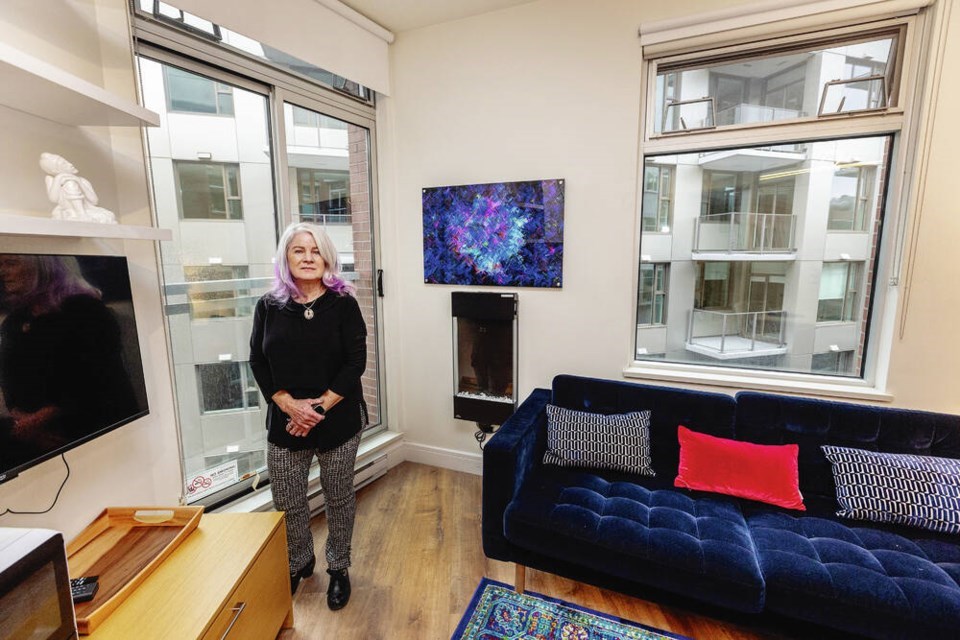Debra Sheets is stunned the province is banning short-term rentals years after she bought four units in the Janion building in downtown Victoria, B.C., to provide what she thought would be a solid foundation for a secure retirement.
The retired UVic nursing instructor said she invested all her money in buying the units and now owes just over $1 million in mortgages.
She sees an uncertain future following the province’s decision to prohibit short-term rentals unless the unit is a principal residence, which is not the case for Sheets.
The planned new rules are among several initiatives the province is bringing forward to help alleviate the ongoing housing shortage.
B.C. is striving to open up thousands of short-term rental units to the long-term market by bringing in new legislation in larger communities by restricting owners holding a number of units from renting them for the short-term unless it is a principal residence.
It is removing a grandfathering clause in the Local Government Act which allowed short-term units to continue operating under a legal non-conforming status because that was their previous use. The province said there are about 1,600 such grandfathered units in Victoria.
Sheets said, similar to many other owners in the Janion, she is not a large corporation. “Most of us are small owners. We are not big organizations.”
She rents a home elsewhere in Greater Victoria and rents out her microloft units via Airbnb.
It is hard work running a short-term rental and is not as lucrative as some think, said Sheets. She’s struggled to make mortgage payments. “It’s not the money-grab that people think it is.”
Apart from looking after her rentals, Sheets spends much of her time volunteering to set up programs and help people dealing with dementia.
“If the goal is to return single-family residences and condo units suitable for long-term housing to the market, why not exempt micro-units like the Janion microlofts from the regulations?” Most of the units are less than 400 square feet.
Size could be used to distinguish condos more suited to short-term stays, she said.
Sheets is reluctant to offer long-term rentals after hearing about difficult tenants and is wondering about selling. She estimates that of the 121 units in her building, about 90 are used as short-term rentals.
Owners make a significant economic investment in the city through fees to the municipality and hiring services, she said.
“Most us live here in Victoria. We’re not absentee landlords.”
Victoria lawyer John Alexander, who specializes in areas such as land-use law, local government and land title, said his phone is ringing non-stop from owners of short-term rentals, most of them Victoria residents.
The legislation will take away land-use rights from owners who have invested in this province and are not receiving compensation, he said. It takes away certainty about an individual’s economic rights.
“It begs the question, ‘What’s next?’ ”
Alexander wonders if other buildings, possibly detached garages or small office buildings, might be designated for housing to create more residential units.
The most significant and serious change will be to take away a legal non-conforming status, which applies to all other changes in land use, he said.
When a municipality downzones a property that is being used, the owner is allowed to continue that use which is grandfathered (as legal-non-conforming). “That’s the flip side of the sections in the municipal act that says there’s no compensation for downzoning.”
At the municipal level, there’s no compensation because an owner already using the property is permitted to continue that use, allowing for some fairness in the zoning change, Alexander said.
But now the province is saying if someone bought a unit for short-term rental, it can’t be used for that anymore and that owner is not going to get any compensation, he said.
“That’s a first in this province, at least since the mid-1900s.”
A potential court challenge might come because the grandfathering rights are being taken away without compensation, he said.
Owners are telling Alexander they bought short-term rental units specifically for that purpose and have been using them to service rising mortgage payments. They project their income will drop by about 40 per cent.
“They are not going to be able to make their mortgage payments. The mortgage companies are going to be left holding the bag here.”



